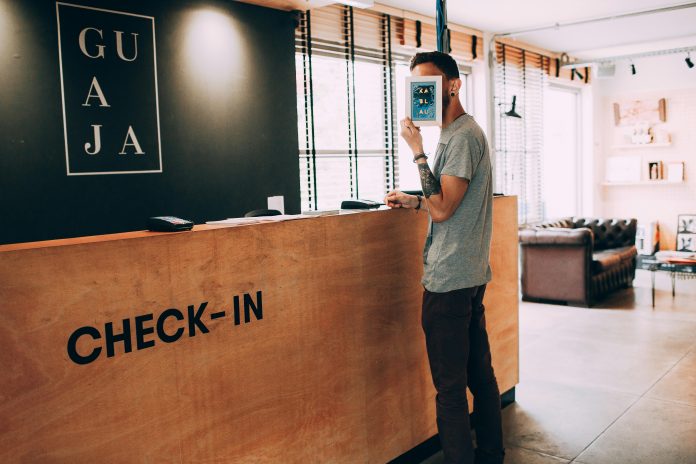In the dynamic world of hospitality, guest satisfaction and efficient operations stand as critical pillars for success. Amidst the evolving landscape, hotels continually seek innovative solutions to streamline processes and enhance the guest experience.
One such groundbreaking tool that has emerged to address these needs is the visitor management system (VMS). Integrating cutting-edge technology with hospitality management, VMS has the potential to revolutionize hotel operations in multifaceted ways.
In this article, we will dive into the transformative impact of VMS within the hospitality industry. We will also explore its benefits and the ways it reshapes traditional approaches to guest management.
Visitor Management Software in Hospitality
Visitor management software (VMS) has become a cornerstone of modern hotel operations, offering a comprehensive solution for managing guest interactions and security protocols. Specifically designed for the hospitality sector, VMS integrates seamlessly with existing hotel management systems, allowing for the efficient exchange of data between departments.
The visitor management system market is driven by a heightened focus on security and risk reduction, with organizations prioritizing the protection of their facilities. Global Market Insights notes that VMS solutions provide an effective way to oversee and regulate visitor access, enhancing overall security protocols.
As security threats evolve, businesses recognize the importance of investing in robust visitor management systems to uphold a secure and well-managed environment.
Its versatility enables hotels to customize features according to their unique needs, whether it’s streamlining the check-in process or enhancing guest services. Moreover, a visitor management solution plays a crucial role in compliance with industry regulations and standards, such as data protection laws and safety protocols.
Greetly notes that hotels can safeguard sensitive information and mitigate risks associated with manual record-keeping by digitizing guest records and implementing stringent security measures.
This software-driven approach not only enhances operational efficiency but also elevates the overall guest experience by minimizing wait times and optimizing service delivery.
Enhancing Security Protocols
Security stands as a top priority in hotel operations, necessitating robust measures to ensure the safety and well-being of guests and staff alike. Visitor management systems offer a comprehensive solution for bolstering security protocols by digitizing the check-in process and implementing stringent access controls.
Through features such as photo identification and real-time monitoring, hotels can verify guest identities more efficiently and mitigate potential security risks.
Moreover, VMS enables seamless integration with existing security systems, including access control and surveillance cameras, creating a unified security infrastructure.
By centralizing data and automating security procedures, VMS enhances overall surveillance capabilities and enables swift response to any security incidents. This proactive approach not only enhances guest confidence but also helps hotels maintain compliance with industry regulations and standards.
Streamlining Guest Check-In Processes
Efficient check-in procedures are essential for setting a positive tone for the guest experience in hotels. Visitor management systems revolutionize this process by offering self-service kiosks and mobile check-in options, reducing wait times, and optimizing staff resources. Guests can complete registration swiftly, minimizing delays and enhancing overall satisfaction.
Integration with reservation systems further expedites the check-in process, allowing for pre-arrival registration and seamless synchronization of guest information. This not only streamlines operations but also allows hotels to personalize the check-in experience, greeting guests by name and anticipating their needs.
According to Hotelier Magazine, travelers now seek the ease of mobile check-in at hotels, driven by the demand for contactless solutions amid the pandemic. Recent research highlights a strong preference for the permanent adoption of contactless check-in/out options.
Hotels are rapidly implementing digital check-in technologies, enabling guests to use their smartphones for quicker access to rooms, enhancing both satisfaction and efficiency.
By leveraging VMS to simplify check-in procedures, hotels can create a memorable first impression that sets the stage for a delightful stay.
Personalizing Guest Services
According to Hospitality Net, personalization lies at the heart of exceptional hospitality. Visitor management systems enable hotels to tailor services to individual guest preferences. By capturing and analyzing guest data, including past stays and preferences, hotels can anticipate needs and create tailored experiences.
From room amenities to dining preferences, this data empowers hotels to deliver personalized services that exceed guest expectations.
Forbes highlights that 50% of customers are open to sharing personal information in exchange for personalized experiences. Benefits and customization are separated by just a single percentage point. Consumers prioritize practicality, and they are willing to share information if it means gaining perks or personalizing their experience.
Moreover, VMS facilitates seamless communication between departments, ensuring that guest preferences are shared across all touchpoints. Whether it’s arranging special amenities or recommending local attractions, hotels can leverage VMS to enhance guest satisfaction at every stage of their stay. By prioritizing personalization, hotels can foster loyalty and drive positive word-of-mouth referrals, ultimately boosting revenue and reputation.
Improving Operational Efficiency
Operational efficiency is critical for maintaining profitability and competitiveness in the hospitality industry. Visitor management systems automate routine tasks, such as data entry and visitor tracking, freeing up staff to focus on delivering exceptional service. Real-time analytics provided by VMS enable hotel management to identify operational bottlenecks and optimize resource allocation, leading to cost savings and improved productivity.
Furthermore, VMS streamlines communication between departments, ensuring seamless coordination and enhancing overall efficiency. By centralizing data and streamlining processes, hotels can minimize errors and delays, resulting in smoother operations and enhanced guest satisfaction. In today’s fast-paced hospitality landscape, VMS is essential for hotels seeking to maximize efficiency and deliver seamless experiences to guests.
Enhancing Guest Experience and Satisfaction
Ultimately, the success of any hotel hinges on guest satisfaction, and visitor management systems play a pivotal role in elevating the guest experience. By facilitating seamless interactions and minimizing friction points, VMS enables hotels to create memorable stays that leave a lasting impression.
From personalized check-in experiences to tailored services, VMS allows hotels to anticipate and exceed guest expectations. Moreover, VMS empowers hotels with valuable insights into guest preferences and behaviors, enabling them to continually refine and enhance their offerings.
By leveraging data-driven insights, hotels can deliver personalized experiences that resonate with guests on a deeper level, fostering loyalty and driving repeat business. In today’s competitive hospitality landscape, VMS is not just a tool for operational efficiency but a catalyst for delivering exceptional guest experiences.
FAQs
Why is personalization important in hospitality?
Personalization in hospitality enhances guest experiences by tailoring services and amenities to individual preferences. It fosters loyalty, increases guest satisfaction, and drives revenue by creating memorable and unique stays that cater specifically to the needs of each guest.
What is the significance of visitor management in hotels?
Visitor management in hotels ensures security, efficiency, and guest satisfaction by regulating visitor access, monitoring guest movements, and enhancing overall safety measures. It helps maintain a secure environment while providing a seamless and welcoming experience for guests.
What are the security measures taken by hotels?
Hotels employ various security measures, including surveillance cameras, access control systems, trained security personnel, and emergency response protocols. Additionally, many hotels invest in technology such as key card access and digital surveillance to safeguard guests, staff, and property.
In conclusion, visitor management systems represent a pivotal advancement in hotel operations, promising heightened security, streamlined processes, and personalized guest experiences. Their integration reflects a proactive approach to addressing evolving industry demands, ensuring both safety and satisfaction in an increasingly competitive landscape.
As hotels adopt VMS technology, they position themselves as leaders in innovation and guest-centric service, poised to elevate standards and exceed expectations. By leveraging the transformative capabilities of VMS, hotels can not only meet but surpass the evolving needs of modern travelers.
























